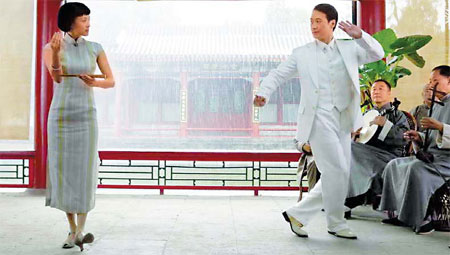 |
|
Zhang Ziyi (left) and Leon Lai in the highly anticipated Forever Enthralled directed by Chen Kaige. [File photo] |
Chen Kaige and Peking Opera master Mei Lanfang share a common motto. "There is no shame in losing, but there is in living in fear."
Turning his cameras back on his pet-passion of Peking Opera was an ambitious and deliberate move by Chen, after his last feature, The Promise (Wu Ji), suffered ruthless criticism on the mainland.
An online parody of his 2005 big-budget fantasy film, which was slammed for its weak storyline and clichs, became even more popular than the original film itself.
But making a movie about Peking Opera was a risky business, considering his 1993 masterpiece Farewell My Concubine (Bawang Bieji), which also focused on the subject, won the Palme d'Or at Cannes, a BAFTA award and garnered two Oscar nominations.
This was always a hard act to follow but Chen is clearly inspired by the protagonist of his new work.
"Let us think of Mei," Chen says. "I often wonder how he dared to perform in America in 1930, a time of depression.
"Nobody in America knew about Peking Opera then, and many of his friends opposed his risky trip. But he made it and his debut won 15 curtain calls. So I should think more about the film itself instead of fearing the evaluations."
Chen actually met Mei when he was a boy because his father was the opera star's friend. Chen remembers graceful "uncle Mei" as a silent man, who would sit upright on a sofa and meditate, and practice swordplay in all-white silk outfit in a quiet courtyard.
Chen was too young to talk with Mei, but remembers his essence, which he has tried to reveal in his new feature Forever Enthralled, released 47 years after Mei's death.
"Mei was not just a person from the old, yellowed papers," Chen says. "He was energetic, beautiful and a true icon."
Known for various female roles, Mei enjoyed high fame and huge popularity over his 50-year stage life thanks to his exquisite performance and continuous innovation.
A saying of his time may explain how popular he was: "All men and women want to marry Mei Lanfang."
During the 1920s and 30s, Mei had the courage to promote Peking Opera abroad, touring Japan, the United States, the Soviet Union and receiving warm welcomes wherever he went.
The University of Southern California and the Pomona College awarded him honorary doctorates. "He was successful needless to say," Chen says.
"What people hardly know is the misery behind him. He was a boy with a sad childhood, an unpopular pupil, a man who did not have a smooth marital life and an actor disdained by writers and philosophers of the early 20th century.
"This film tells people that Mei had hardships, too, and when he dealt with these hardships, he experienced the same torture as we common people do."
Mei was born in 1894 in a brothel area in Beijing. His father died when he was 4, and his mother passed away 10 years later. He started learning Peking Opera at 7, but was too slow a student to impress his first teacher, who gave him up and claimed he had no flair.
Even after his star rose in his early 20s, he was harshly criticized by influential writers, such as Lu Xun and Chen Duxiu, who, in view of China's suffering because of the invasion of Western nations in the 19th and early 20th centuries, criticized traditional Chinese culture and called for democracy and science to address social problems.
Peking Opera and its performers became an easy target for the revolutionaries.
"Mei was wearing 'paper shackles' all his life," Chen says. "His family, supporters, fans, media and society all had requirements for him."
"He had to be right in all aspects. The shackles were invisible and fragile, but he could not tear them off."
The film reveals how Mei became seriously ill, and how he also grew a moustache in 1941, so he couldn't play female roles for the Japanese invaders.
"I think he was afraid, too, although it was a correct decision," Chen says. "A star does not leave the stage in his heyday. It was too risky."
In Chen's opinion, the person who understood Mei best was famous Peking Opera actress and lover Meng Xiaodong.
Their love story caused a big stir in the 1920s. Mei was already married, but he married Meng anyway.
The romance between the king and queen of Peking Opera ended sadly. Under growing social and family pressure they split and Meng left the Chinese mainland in 1949 never to return.
A good chunk of the 150-minute film is devoted to the love story.
"It was huge news at that time," Chen says. "Although they were together for only three to four years, they influenced each other profoundly."
The film's story ends in 1945, when Mei was able to return to the stage after Japan's defeat in World War II.
Chen does not care much about the comparison between his latest opus, which premieres this Friday, with Farewell My Concubine.
"I would cite Dickens: It was the best of times, it was the worst of times," he says.
"We have so many choices now, but we have to face all kind of judgments, too.
"If this is something we have to do, why not accept it?"
(China Daily December 2, 2008)